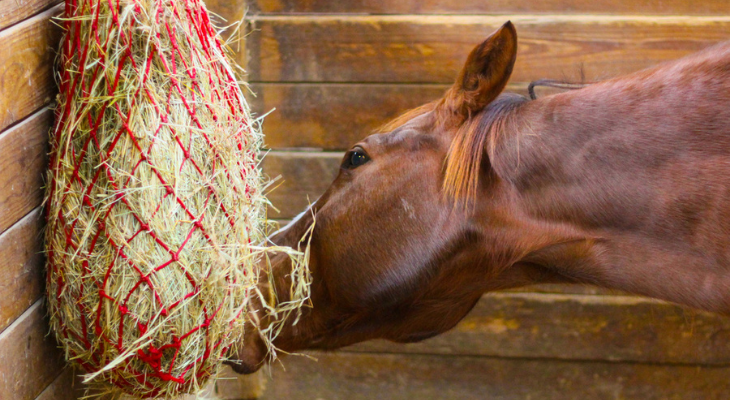
How to Slow Down Your Fast Eater to Reduce the Risk of Equine Choke
Eating too rapidly is a common cause of equine choke, a condition that occurs when your horse's esophagus becomes blocked. If you have a fast eater, making a few feeding changes will decrease the likelihood that your horse will develop equine choke.
Choke Symptoms and Causes
Choke is more likely to occur if your horse bolts down dry hay, concentrated feed, or other types of feed. Saliva normally moistens the feed, making it easier to pass through the esophagus, the tube that carries food from the mouth to the stomach.
When your horse eats quickly, there's not enough time for the saliva to soften the feed. Dry feed can collect in a thick ball that becomes stuck in the esophagus, blocking it completely or partially. Although your horse tries to swallow, the blockage doesn't budge.
Signs of equine choke may include:
- Repeated attempts at swallowing
- Coughing or gagging
- Feed and saliva discharge from your horse's mouth and nose
- Not eating
- Extended neck
- Drooling
What You Can Do to Prevent Choke
Choke is an emergency that could lead to dehydration, pneumonia, infection, and even death if not treated promptly by your equine veterinarian. Fortunately, you can reduce your horse's risk of developing the condition by following these suggestions:
- Schedule a Dental Exam. Your horse may not be chewing food properly due to an abscess or painful cuts caused by a sharp tooth. Dental treatment will improve your horse's comfort and chewing ability.
- Try a Grazing Muzzle. Muzzles aren't just helpful for grazing horses. Fitting your horse with a grazing muzzle will also force it to eat grains much more slowly.
- Free Feed Your Horse. When feed is only offered a few times per day, feeding-related stress may cause your horse to gulp it down in a matter of minutes. Making feed readily available can curb that behavior. Of course, if you decide to free feed, you'll probably want to offer lower-calorie feed, like Timothy or Bermuda hay.
- Feed More Often. Just like free feeding, providing many small meals during the day may make your horse feel less stressed about the food supply.
- Use a Slow-Feed Hay Net. Your horse has to work to get the hay out of the small holes in the net, which slows down eating and reduces waste. It may take a little while for your horse to get used to the new feeding method. Equine Wellness suggests placing hay in the net and also next to it for a few days until your horse figures out how the slow-feed hay net works.
- Don't Let the Bullies Win. A horse may eat more rapidly if it's afraid that another horse will steal its food. If you think bullying behavior may be a contributing factor, separate the horses during feeding.
- Add Obstacles to the Feed Bucket. Your horse will need to eat more carefully and slowly if the bucket contains a few rocks or balls.
- Add Feed to a Tray. Spreading feed in a tray, rather than placing it in a bucket, will slow down your fast eater.
- Soak the Feed. Wet feed passes through the esophagus more easily than dry feed. If your horse is prone to developing choke, moistening the feed may offer a solution to the problem.
Do you need a little help with feeding issues? Contact our office to arrange a visit with the equine veterinarian.
Sources:
The Horse: Understanding Choke in Horses, 11/27/20
PetMD: When Horses Choke, 5/31/12
Paulick Report: Slow Down! Tricks to Slow a Speedy Eater
Equine Wellness: 3 Simple Ways to Slow Down the Fast Eater, 3/21/19
